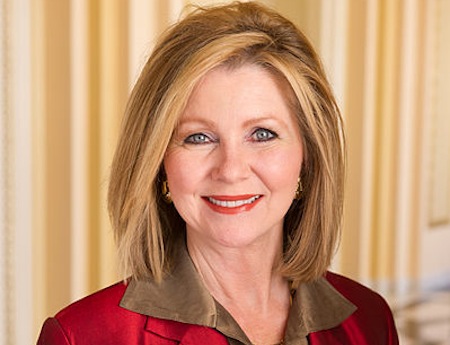Blackburn: Net Neutrality Sends Wrong Message

The smarter way to stay on top of broadcasting and cable industry. Sign up below
You are now subscribed
Your newsletter sign-up was successful
A House Internet governance hearing Wednesday became a venue for some Republican pushback on net neutrality rules.
The setting was a House Communications Subcommittee hearing on the National Telecommunications and Information Administration's proposal earlier this month to seek a multistakeholder plan to hand off its oversight function of ICANN (Internet Corporation for Assigned Names and Numbers), the Internet domain name registry.
Leading that charge was Rep. Marsha Blackburn (R-Tenn.). In her opening statement, she said: "If this Administration wants to prove to Congress and the international community that they are serious about this process they must immediately bring an end to Net Neutrality. Telling Congress and the international community that they are serious about relinquishing control over the IANA [Internet Assigned Numbers Authority] contract while simultaneously having the FCC working to promote Net Neutrality is disingenuous at best and will continue to weaken our international position," she said
Blackburn quoted Republican commissioner Michael O'Rielly from a speech to the Federal Communications Bar Association Tuesday about the ICANN initiative, in which, taking a page from his predecessor and friend Rob McDowell, said that “the FCC’s network neutrality proceeding could severely contradict and undermine the U.S. government’s international position.”
That concern then became the focus of her questioning. She asked NTIA chief Lawrence Strickling whether he thought the FCC's actions to restore its network neutrality rules could be used as a pretext or excuse by bad actors to assert control over the Internet.
Strickling was not biting on that one, saying it was a case of apples and oranges.
Rep Ben Lujan (D- N.M.) came to the defense of the FCC's rules. He said he thought it was a boon, not a hindrance, that the FCC was trying to protect Internet openness by preventing ISPs from becoming gatekeepers that could block and throttle content.
The smarter way to stay on top of broadcasting and cable industry. Sign up below
Blackburn also tried to get Fadi Chehadé, president of ICANN, to comment on the possible impact on the multistakeholder hand-off of the FCC's net neutrality effort, but he pointed out that ICANN did not deal with content. He did point out that the U.S. government is solidly behind the multistakeholder model.
Republicans are concerned that ICANN not rush the handover for fear that the Russians or Chinese or some other presumed bad actor might rush in to fill any vacuum. It was that same bipartisan concern that drove Congress last year to pass unanimously a resolution supporting the multistakeholder model of Internet governance. Rep. Anna Eshoo (D-Calif.) pointed to that resolution in arguing that the ICANN handoff was in the same spirit since it was sending the signal that there should be a multistakeholder model for naming oversight, rather than U.S. oversight.
Strickling said that no bad actor was going to happen because NTIA would not accept any transition proposal from stakeholders that proposed a government or intergovernmental role. He also confirmed that the stakeholders expected to be overseeing the current NTIA oversight functions, which are now primarily symbolic, said Chehadé, include many familiar names, Comcast, Google, AT&T and many more.
Asked by Rep. Doris Matsui (D-Calif.) whether he would commit to an open and transparent transition plan process, Chehadé said absolutely and if it wasn't, NTIA should reject it.
Chehadé said repeatedly that ICANN would remain the same open, transparent, bottom-up process that had worked so well thus far, leading Rep. Joe Barton (R-Texas) to suggest that it didn't sound broke, so why fix it.
Chehadé said the U.S. role could send the wrong signal, so it was important to make ICANN free of any appearance of one government's control.
Barton argued that one of the reasons ICANN was so successful was the backing of the "full faith and credit" of the U.S. and of its values of openness.
Contributing editor John Eggerton has been an editor and/or writer on media regulation, legislation and policy for over four decades, including covering the FCC, FTC, Congress, the major media trade associations, and the federal courts. In addition to Multichannel News and Broadcasting + Cable, his work has appeared in Radio World, TV Technology, TV Fax, This Week in Consumer Electronics, Variety and the Encyclopedia Britannica.

